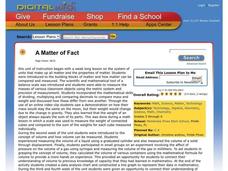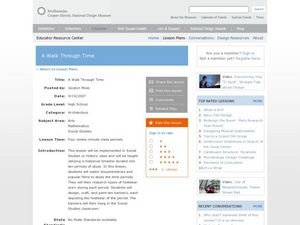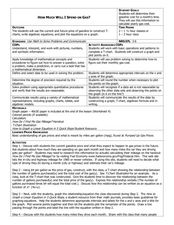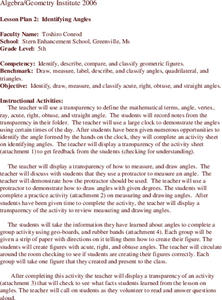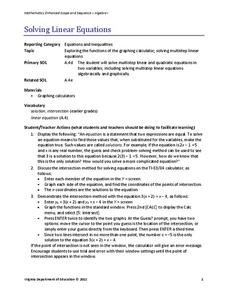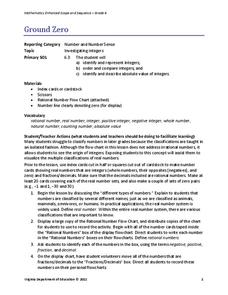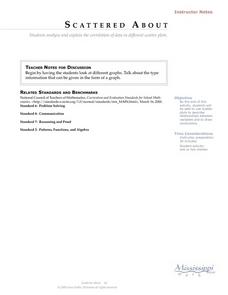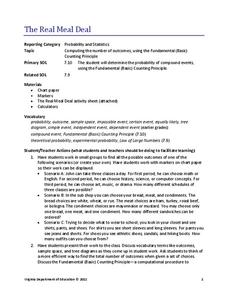T. Smith Publishing
Completing Number Patterns Worksheet 2
Rows of numerals in patterns are displayed leaving the last two spaces open for little learners to complete. This is perfect pattern practice when working toward meeting Common Core standards.
Curated OER
Quiz: Calculator Fun
In this calculator fun worksheet, students use a calculator to find the product, quotient, sum and difference of given equations. Afterward, they turn the calculator upside-down to discover a word displayed on the calculator screen. This...
Curated OER
It Counts
Young scholars explore one to one number correspondence. In this early math lesson plan, students make observations about and classify plants in order to gain an understanding of using numbers to describe their world.
Curated OER
A Matter of Fact
Students design their own Science experiment. In this science experiment lesson plan students create a hypothesis related to matter and test it. They displayed their data in a graph.
Curated OER
Computer Olympics
Students compete to achieve excellence in math facts, writing terms, problem solving, and writing skills on the computer. In this Computer Olympics lesson plan, students practice the skill of drill and practice in order to succeed and...
Curated OER
A Walk Through Time
Students investigate the types of footwear worn during ten periods of history. In this secondary, art/math/social studies lesson, students view documentaries and popular films to study the time periods. Students research the...
Curated OER
Investigation-Pattern/Functions
Middle schoolers explore number patterns. In this number patterns and probability math lesson, students work in groups to describe the patterns present in the first five rows of Pascal's Triangle, then write numbers to continue this...
Curated OER
How Much Will I Spend On Gas?
Students construct a linear graph. In this graphing lesson plan, students determine a monthly budget for gasoline. Students construct a t-chart and coordinate graph to display data. Resources are provided.
Curated OER
Watts Up Doc?
Learners examine the wattage of a light bulb using math. In this algebra lesson, students find the inverse square of given parameter. They work in groups collecting and analyzing data.
Curated OER
Estimation and Computation
Second graders practice their estimation skills using blocks. For this math lesson, 2nd graders explain how estimating makes addition easier. They complete a worksheet after the lesson to reinforce new learning.
Curated OER
Monitoring an Epidemic: Analyzing Through Graphical Displays Factors Relating to the Spread of HIV/AIDS
Tenth graders differentiate pandemic and epidemic. In this health science lesson, 10th graders analyze how HIV and AIDS affect different countries. They construct and interpret different types of graphs.
Curated OER
Identifying Angles
Students identify names of angles. They use a large clock to demonstrate angles using certain times of day. Given a geoboard, students create figures with acute, right, and obtuse angles.
Curated OER
Draw the Hands
A set of analog clock-faces (sans the hands) give learners nine opportunities to practice telling time. They draw in the minute and hour hands based on times written below each clock face. Times are either on the hour or the half-hour....
Curated OER
Coin Comparison Worksheet
Use this one-page worksheet to assess young learners’ ability to correctly compare a series of coins. Each problem asks counters to indicate with the correct symbol whether the total value of the coins in the left column is greater than,...
Curated OER
Arrays
Learners solve six word problems where they use the array model of multiplication to find the product of multiplication problems with factors 0 to 12.
Curated OER
In Round Numbers
Young scholars explore the concept of rounding. In this rounding lesson, students use their calculator to round three digit numbers to the nearest 10 or nearest 100. Young scholars round fractional numbers to the nearest...
Virginia Department of Education
Solving Linear Equations
Practice solving linear equations by graphing. Scholars learn to solve multi-step linear equations in one variable by graphing both sides of the equation separately. They use graphing calculators to find the intersection of the graphs.
Virginia Department of Education
Ground Zero
Don't harbor any negative feelings toward negative numbers. Scholars learn about different classifications of rational numbers, including negative integers. They also develop definitions of the opposite and the absolute value of a...
Curated OER
Greatest Common Factor
Given 10 number pairs, learners find the greatest common factor for each. For several, one of the numbers is the greatest common factor, and for others mathematicians will need to think a little harder. There space for learners to show...
Curated OER
Least Common Multiple
Given ten pairs of numbers, mathematicians find the least common multiple for each. The numbers span from 2-30, and are generally introductory for this skill (no curve balls). Encourage learners to write out multiples alongside the...
Curated OER
Scattered About
Students are introduced to the concept of scatter plots after reviewing the various types of graphs. In groups, they analyze the type of information one can receive from a scatter plot and identify the relationship between the x and y...
Virginia Department of Education
The Real Meal Deal
Burgers and salads and sodas, oh my! Scholars use a menu to investigate the Fundamental Counting Principle. They create tree diagrams to illustrate the number of possible choices for each given scenario.
Curated OER
Using a Multiplication Table to Divide
Learners solve division problems. In this multiplication and division lesson plan, pupils practice using a multiplication table to find a missing factor in a multiplication sentence. They use the same strategy to find a missing quotient...
Curated OER
Introducing the Concept: Exponents and Powers of Ten
Fifth and sixth graders gain information about the powers of ten and exponents. They participate in a teacher demonstration of how using the powers of ten helps learn the place value chart. Pupils create their own place value chart.





